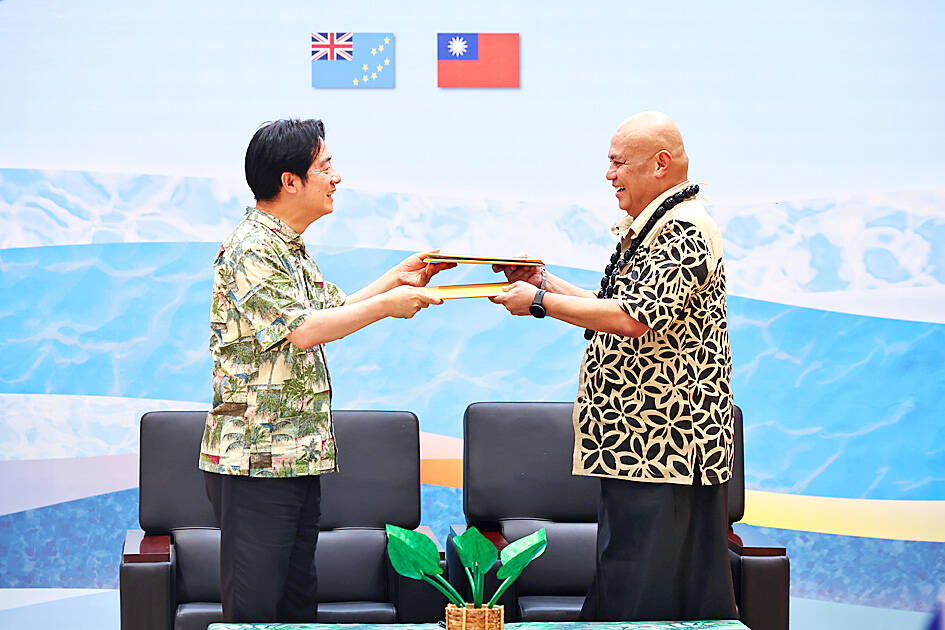Taiwan’s embassy in Tuvalu has accused China of engaging in a “disinformation” campaign to sabotage diplomatic ties with the Pacific ally after a Chinese government-funded news Web site showed clips of Tuvaluans backing a switch in allegiance to Beijing.
The embassy objected specifically to two videos of Tuvaluan people voicing pro-Beijing talking points released by China Global Television Network (CGTN), a branch of the state-run China Media Group under the Chinese Communist Party’s Central Propaganda Department.
The embassy said in a statement yesterday that although it respected freedom of speech, it could not tolerate Beijing’s disinformation.

Photo: CNA
“We firmly oppose and condemn, while also remaining highly vigilant against, China’s manipulation of disinformation to conduct cognitive warfare, aiming to undermine Taiwan-Tuvalu relations and weaken democratic values,” the embassy said.
In one of the videos released last month that the embassy objected to, titled “Tuvalu residents say Taiwan is part of China,” a woman identified only as “Mary” criticized President William Lai’s (賴清德) visit last month to the Pacific ally.
“This visit does not bring any real economic or social impact to Tuvalu. He has not proposed any concrete aid projects or funding,” Mary said in the clip.
Another resident identified only as “Thomas” was shown voicing a common Chinese refrain that according to UN Resolution 2758, “Taiwan is a part of China, which is a widely recognized international consensus.”
“Establishing diplomatic relations with China could offer real development opportunities, such as infrastructure building and enhanced climate resilience,” he said.
Another CGTN video titled “Tuvaluan student’s life inspired by Chinese culture” released this month featured a woman identified as Tuvaluan student Lilly Rose.
Rose said China has played a significant role in infrastructure projects in the Pacific and that Chinese technology has greatly helped island countries like Tuvalu to tackle climate change.
Lai visited Tuvalu last month as part of a seven-day trip that also took him to two other allies in the region, the Marshall Islands and Palau, as well as stopovers in Hawaii and Guam.
While in Tuvalu, Lai and Tuvaluan Prime Minister Feleti Teo signed a joint communique pledging to deepen bilateral ties to mark the 45th anniversary of formal diplomatic ties, which were established in 1979.
In addition to the communique, Taiwan and Tuvalu also signed a letter of intent to formalize Taiwan’s commitment to supporting the construction of a submarine cable connected to the Pacific nation.

Several Chinese Nationalist Party (KMT) officials including Chairman Eric Chu (朱立倫) are to be summoned for questioning and then transferred to prosecutors for holding an illegal assembly in Taipei last night, the Taipei Police said today. Chu and two others hosted an illegal assembly and are to be requested to explain their actions, the Taipei City Police Department's Zhongzheng (中正) First Precinct said, referring to a protest held after Huang Lu Chin-ju (黃呂錦茹), KMT Taipei's chapter director, and several other KMT staffers were questioned for alleged signature forgery in recall petitions against Democratic Progressive Party (DPP) legislators. Taipei prosecutors had filed

Taiwan would welcome the return of Honduras as a diplomatic ally if its next president decides to make such a move, Minister of Foreign Affairs Lin Chia-lung (林佳龍) said yesterday. “Of course, we would welcome Honduras if they want to restore diplomatic ties with Taiwan after their elections,” Lin said at a meeting of the legislature’s Foreign Affairs and National Defense Committee, when asked to comment on statements made by two of the three Honduran presidential candidates during the presidential campaign in the Central American country. Taiwan is paying close attention to the region as a whole in the wake of a

President William Lai (賴清德) has appointed former vice president Chen Chien-jen (陳建仁) to attend the late Pope Francis’ funeral at the Vatican City on Saturday on his behalf, the Ministry of Foreign Affairs said today. The Holy See announced Francis’ funeral would take place on Saturday at 10am in St Peter’s Square. The ministry expressed condolences over Francis’ passing and said that Chen would represent Taiwan at the funeral and offer condolences in person. Taiwan and the Vatican have a long-standing and close diplomatic relationship, the ministry said. Both sides agreed to have Chen represent Taiwan at the funeral, given his Catholic identity and

NEW WORLD: Taiwan is pursuing innovative approaches to international relations through economics, trade and values-based diplomacy, the foreign minister said Taiwan would implement a “three-chain strategy” that promotes democratic values in response to US tariffs, Minister of Foreign Affairs Lin Chia-lung (林佳龍) said. Taiwan would aim to create a “global democratic value chain,” seek to capitalize on its position within the first island chain and promote a “non-red supply chain,” Lin was quoted as saying in the ministry’s written report to the Legislative Yuan submitted ahead of the legislature’s Foreign Affairs and National Defense Committee meeting slated for today. The Ministry would also uphold a spirit of mutual beneficial collaboration, maintaining close communication and consultations with Washington to show that Taiwan-US cooperation